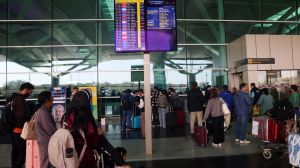First CJI note in, we are waiting for one on strike judges: Govt
The Government has so far received only a part of the recommendations made last month by the Supreme Court collegium—the part relating ...

The Government has so far received only a part of the recommendations made last month by the Supreme Court collegium—the part relating to selection of Chief Justices for eight High Courts. Law Minister H R Bhardwaj is still awaiting the other and more significant part of the collegium’s recommendations regarding the transfer of 10 High Court judges after complaints against them. These include two judges Justices G S Singhvi and V K Bali who led a strike six months ago in Chandigarh.
The delay in forwarding these transfer proposals has created a piquant situation in the Punjab and Haryana High Court: While Chief Justice B K Roy is being moved out for cracking the whip, Justices Singhvi and Bali remain untouched—at least for the time being.
Bhardwaj underlined the irony of the situation when he was asked today about the October 12 report of The Indian Express which, among other things, brought out that the collegium had decided to transfer Justices Singhvi and Bali for organising the first ever strike by members of the higher judiciary.
‘‘This concerns judicial discipline. I am confident that CJI will take punitive action against errant judges,’’ Bhardwaj told reporters, a day after he heard from Chief Justice of India R C Lahoti only about the reshuffle of Chief Justices.
Responding to questions, Bhardwaj made it clear that the collegium’s proposal to transfer two judges for the strike and eight others from three High Courts on the basis of complaints received against them is pending with Chief Justice Lahoti.
The collegium’s decision in this regard is historic as it is talking in terms of transferring judges for the first time since the judiciary abandoned its experiment of 1993-94 to have one-third of the bench in every high court from outside the state.
If a judge is transferred under the current policy, it will have to be either on his own request or as action on complaints.
But, for the record, no transfer, whether of a judge or a Chief Justice, may actually be shown as a punishment. As the memorandum prescribing the procedure puts it, ‘‘All transfers are to be made in public interest i.e. for promoting better administration of justice throughout the country.’’
Accordingly, the CJI’s communication on the transfer of Chief Justice Roy from Chandigarh does not suggest in any manner that he was being punished for precipitating the judges’ strike. Bhardwaj all the same hinted that he would look closely at the proposal to repatriate Roy to his home town Patna. This is because it is contrary to the 25-year-old policy of the Chief Justice of a High Court being from outside the state.
- 01
- 02
- 03
- 04
- 05































